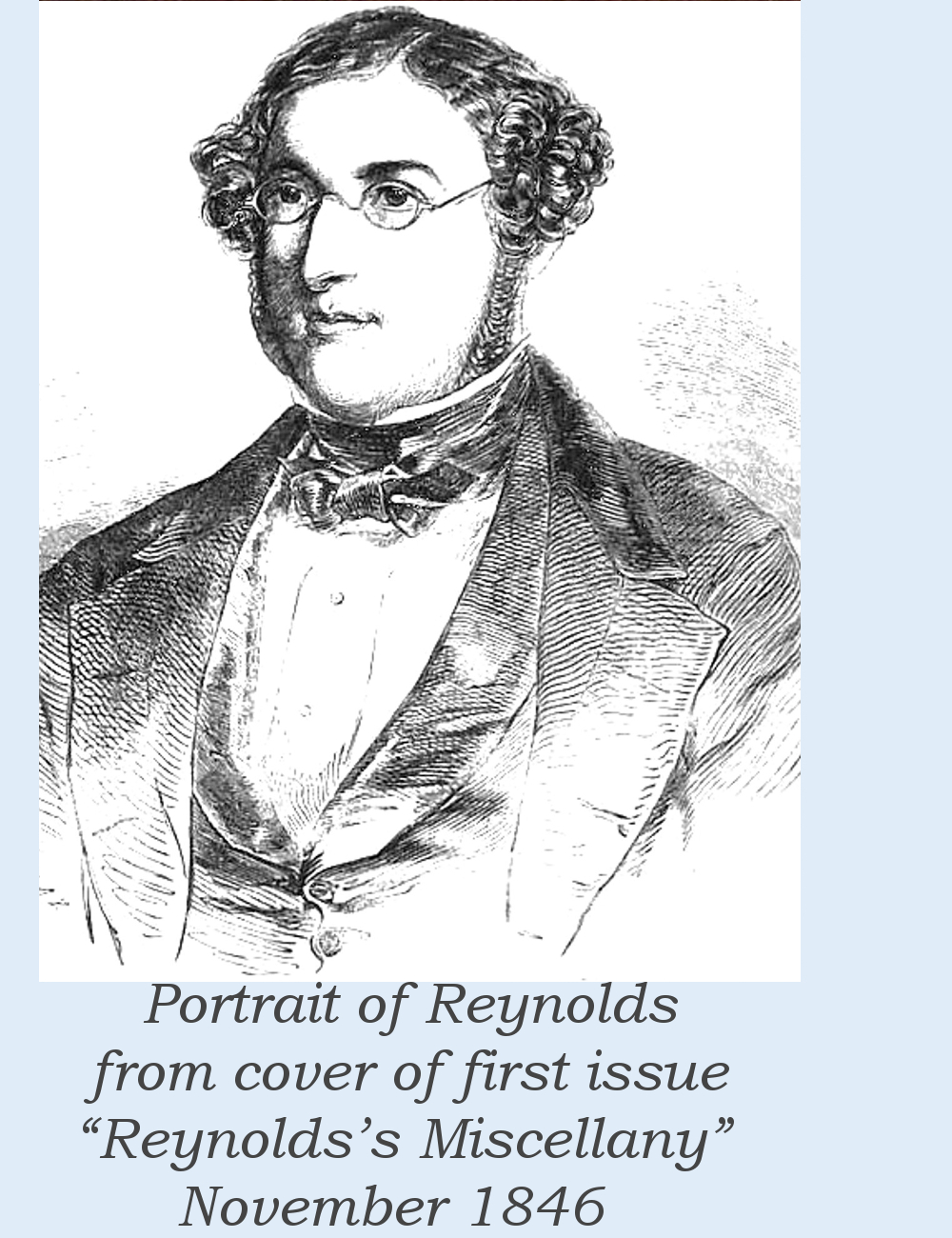
George W. M. Reynolds
 Biography
BiographyGeorge William MacArthur Reynolds (July 23, 1814–June 19, 1879) was a British fiction writer and journalist born in Sandwich, Kent, the son of Captain Sir George Reynolds, a flag officer of the Royal Navy. Reynolds was educated first at Dr. Nance’s school in Ashford, Kent, and then attended the Royal Military College, Sandhurst, with the goal being a career in the British Army. But his parents died in 1829 and with his subsequent inheritance he decided to devote himself instead to literary pursuits. He left Sandhurst in September 1830 and for the next few years traveled, particularly in France, and became a naturalised French citizen. He began residence in Paris in 1834, where he started a daily English newspaper that failed, leaving him bankrupt. He returned to England in 1836 where he served as editor of The Teetotaler (a weekly journal advocating teetotalism) beginning in 1840.
Reynolds was a prolific writer of popular fiction. Almost forgotten now, during his lifetime he was more read than Dickens or Thackeray; in his obituary the trade magazine The Bookseller called Reynolds “the most popular writer of our times.” His best-known work was the long-running serial The Mysteries of London which borrowed liberally in concept from Eugène Sue’s Les Mystères de Paris (The Mysteries of Paris). It sold 40,000 copies a week in penny instalments and more than a million copies cumulatively before it was issued in bound volumes, enjoying an international circulation in French, German, Italian, and Spanish translations. Although it was outlawed by the authorities, the German version achieved the status of a cult favourite on the Russian black market.
Reynolds was also a major figure in the Chartist movement (a working-class male suffrage movement for political reform in Britain that existed from 1838 to 1857). In 1846 he founded two magazines, Reynolds’s Miscellany and The London Journal. In 1849, he founded Reynolds’s Political Instructor, which in May 1850 became Reynolds Weekly Newspaper, the leading radical newspaper of the post-Chartist era. It long survived him, ending publication in 1967 as the Sunday Citizen. In 1854 he relocated to Herne Bay in Kent, where he became one of the town’s Improvement Commissioners. Reynolds was an advocate of British Republicanism; much of his journalism, especially during the 1870s, “promoted a levelling agenda against traditional social hierarchies and accentuated the difficulties of the British throne.” [Andrzej Olechnowicz]
Bibliography (wildly incomplete)
The Youthful Imposter (1835, reprinted in 1847 as The Parricide)
Pickwick Abroad; or, the Tour in France (1837)
Alfred; or, the Adventures of a French Gentleman (1838)
Grace Darling; or, the Heroine of the Ferne Islands (1839)
Robert Macaire; or, The French Bandit in England (1839, alt title The French Bandit in London)
Modern Literature of France (non-fiction, 1839)
The Steam Packet: a Tale of the River and Ocean (1840)
The Mysteries of London (weekly serial, 1844–48)
Master Timothy’s Book-Case; or, The Magic Lanthorn of the World (1844)
Wagner the Werewolf (1846)
Faust: A Romance of the Secret Tribunals (1847)
Wagner, the Wehr-Wolf (1847)
The Rye House Plot; or, Ruth, the Conspirator’s Daughter (1853)
Loves of the Harem (1855)
The Empress Eugenie’s Boudoir (1856)
Other links
G.W.M. Reynolds Society
Wikipedia